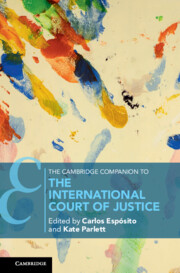Book contents
- The Cambridge Companion to the International Court of Justice
- Cambridge Companions to Law
- The Cambridge Companion to The International Court of Justice
- Copyright page
- Contents
- Contributors
- Preface
- Introduction
- Part I The Role of the ICJ
- Part II The ICJ and International Dispute Settlement
- 6 The Jurisdiction of the Court
- 7 Provisional Measures
- 8 The International Court of Justice as the Master of the Sources
- 9 Fact-Finding and Expert Evidence
- 10 The ICJ and Other Courts and Tribunals: Integration and Fragmentation
- 11 The Working Practices of the Court
- 12 Procedure in Contentious Cases: Evolution and Flexibility
- 13 Effective Advocacy at the ICJ
- Part III The Impact of the ICJ’s Jurisprudence
- Index
- References
12 - Procedure in Contentious Cases: Evolution and Flexibility
from Part II - The ICJ and International Dispute Settlement
Published online by Cambridge University Press: 18 May 2023
- The Cambridge Companion to the International Court of Justice
- Cambridge Companions to Law
- The Cambridge Companion to The International Court of Justice
- Copyright page
- Contents
- Contributors
- Preface
- Introduction
- Part I The Role of the ICJ
- Part II The ICJ and International Dispute Settlement
- 6 The Jurisdiction of the Court
- 7 Provisional Measures
- 8 The International Court of Justice as the Master of the Sources
- 9 Fact-Finding and Expert Evidence
- 10 The ICJ and Other Courts and Tribunals: Integration and Fragmentation
- 11 The Working Practices of the Court
- 12 Procedure in Contentious Cases: Evolution and Flexibility
- 13 Effective Advocacy at the ICJ
- Part III The Impact of the ICJ’s Jurisprudence
- Index
- References
Summary
This chapter examines specific aspects of the Court’s procedure in contentious cases. The authors focus on the key features of procedure: the institution of proceedings; provisional measures; preliminary objections; intervention; and non-appearance. For each of these aspects of procedure, the authors set out the current rules and practice, commenting on the way in which they have evolved, and making some suggestions for further innovation by the Court. They note that there have been recent calls urging he Court to codify aspects of its practice on procedural issues into generally applicable rules. While this might seem an attractive approach, the authors argue that this has the potential to unduly restrict the way in which the Court addresses cases – each of which may have its own particular procedural needs. They emphasise the need for the Court not to be overly prescriptive, but to ensure that it retains power to ensure a fair and just outcome in each particular case.
Keywords
- Type
- Chapter
- Information
- The Cambridge Companion to the International Court of Justice , pp. 247 - 276Publisher: Cambridge University PressPrint publication year: 2023

